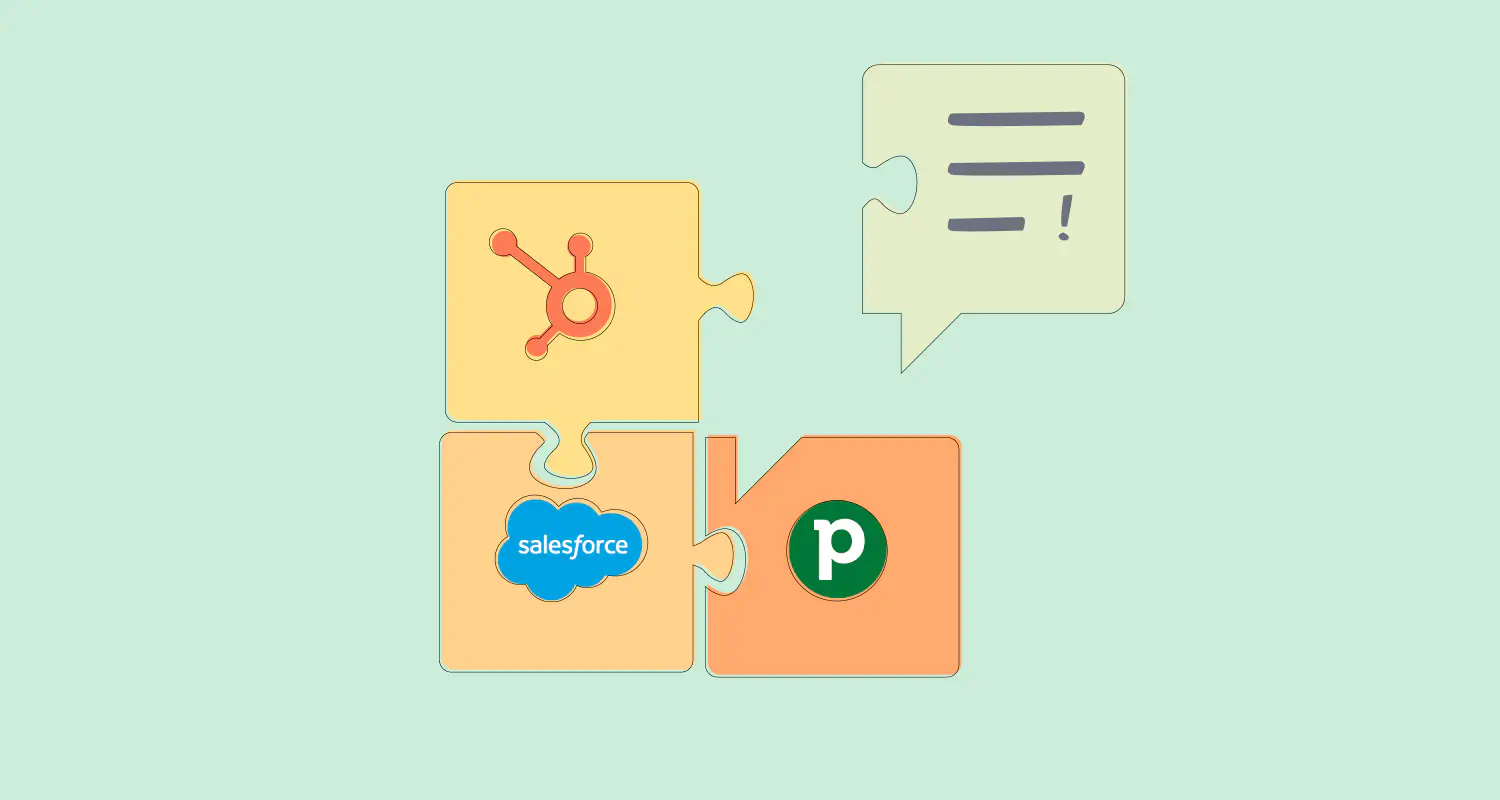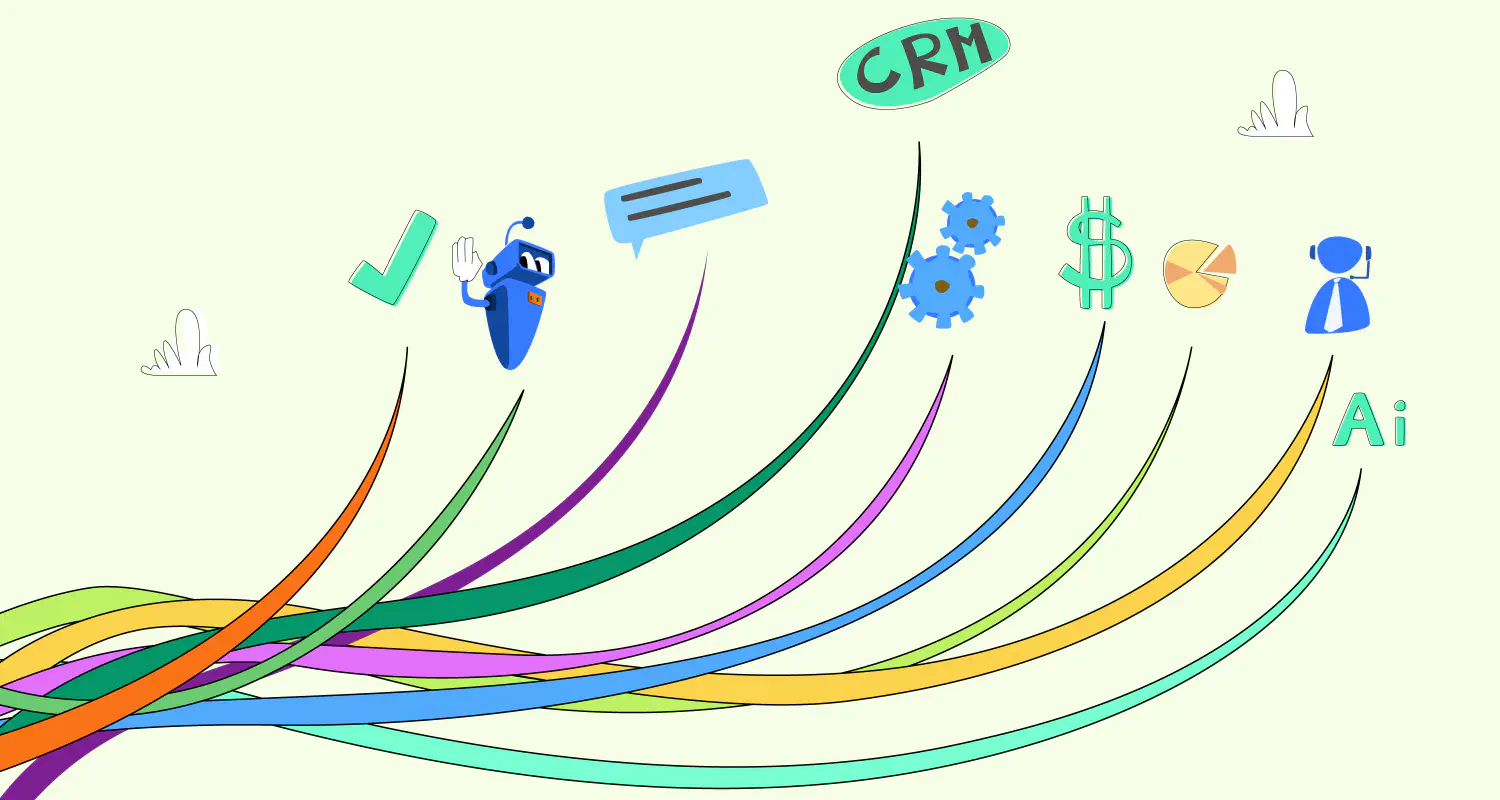Why WhatsApp Is the Future of B2B Sales and Customer Engagement

The success of B2B sales depends on two undeniable facts: every second counts and every lead matters. But how do you keep up with customer demands without losing the personal touch B2B sales need? The answer is simple: WhatsApp Business.
For years, email has been the main communication channel for B2B sales. It promised quick exchanges and clear communication. But today, that promise is long forgotten. Emails can’t keep up anymore. They’re slow, impersonal, and end up in spam folders more often than not.
What’s a better tool to replace email than WhatsApp? It allows real-time communication, helps you build more genuine connections with customers, and most of your target audience is already using it. Imagine you can respond immediately, nurture leads without the endless back-and-forth, and have everything you need in one platform.
In this article, we’ll show you how WhatsApp Business started and why we think it’ll slowly become the go-to app to run B2B communication, sales processes, and customer engagement activities.
History of WhatsApp Business
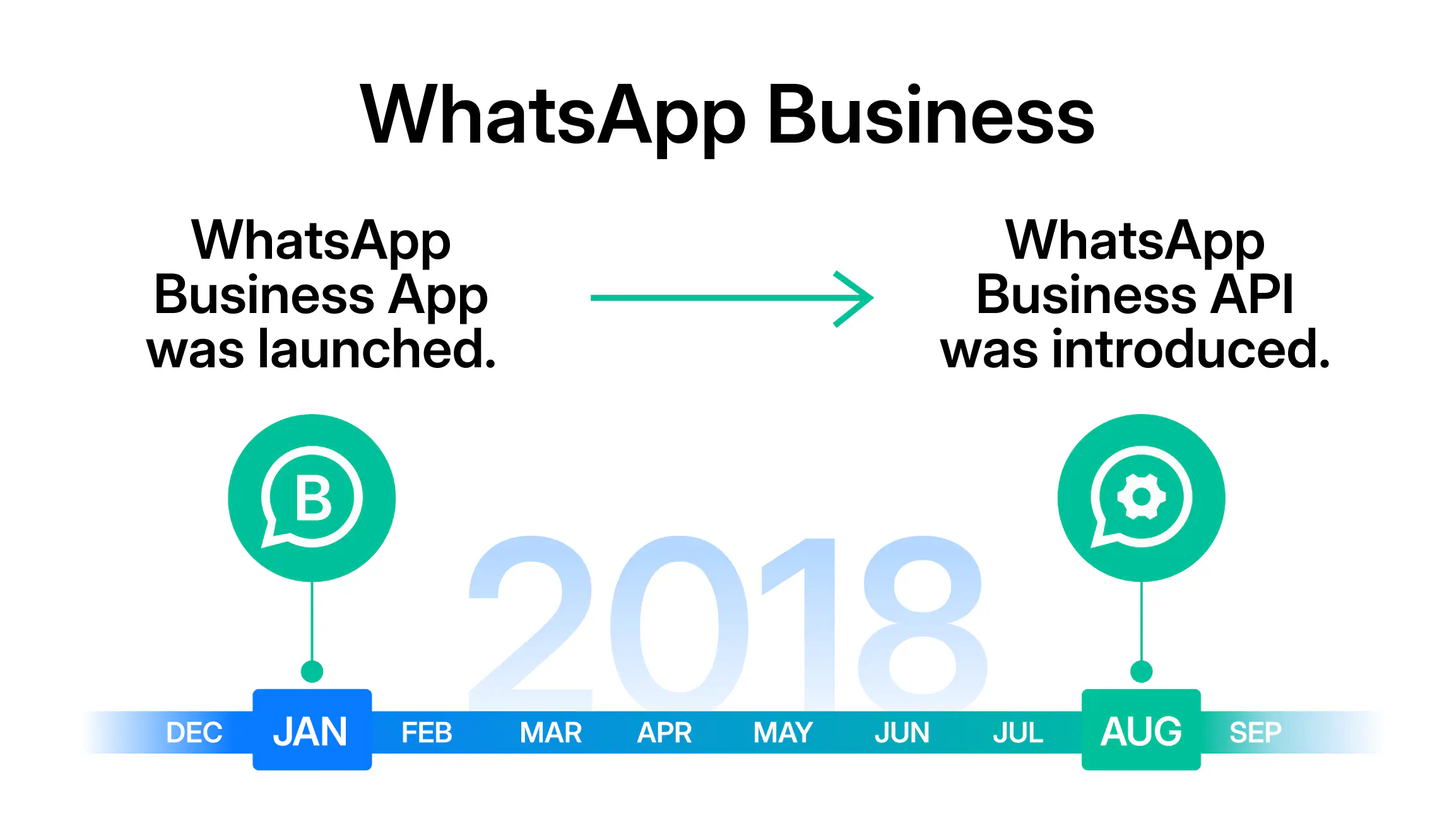
What if you could connect with your customers instantly, with no waiting, no missed calls, and no lengthy emails? That’s the idea WhatsApp introduced to the business world in 2018.
The story of launching WhatsApp Business is an interesting one. When WhatsApp Business app was introduced, it gave businesses a direct and personal line to their customers. It has features like business profiles to make companies look more trustworthy to customers, automated messages for faster response, and catalogs for showcasing services and products.
As more and more businesses adopted WhatsApp Business, it quickly became a common solution for small businesses, but the keyword here? Small. WhatsApp still wasn’t the top choice for medium and large businesses, and that’s when the API came in.
Introduction of WhatsApp API
The WhatsApp Business API was launched to help small businesses scale further than the app allows and support the growth of medium to large businesses. Its features support a lot of business types, including both B2C and B2B companies. However, our main focus today is how it can help B2B companies drive sales.
Unlike the WhatsApp Business app, which runs on a single device and is ideal for small businesses, the API operates on cloud-based or on-premise servers, allowing companies to integrate WhatsApp into their existing sales and support systems.
Because the API is hosted externally, it can handle higher message volumes, support multiple users, and connect with CRMs, automation tools, and any other platform you’re using. By allowing these integrations, the API helps you fit WhatsApp into your tech stack and build a smooth workflow where all your tools are connected.
How companies use WhatsApp Business
With the API in place and advanced features on the rise, people started using WhatsApp to scale their marketing efforts. They could send more messages at once thanks to the API, so why not? However, WhatsApp had different plans.
To protect its users from spam and maintain their privacy, WhatsApp put strict guidelines in place. Customers need to opt-in on WhatsApp before you’re able to send them promotional messages. And if you sent messages at scale, they could be marked as spam, and the worst-case scenario? WhatsApp could ban your account.
Not only that but to increase your messaging limit, you had to verify your account and maintain a high-quality rating. If your rating goes low, your limit decreases.
Because of this, WhatsApp’s use cases started to expand beyond marketing.
The shift to sales on WhatsApp
After the introduction of a few features that support sales, WhatsApp started to look like an attractive channel for selling.
Features like quick replies allowed sales teams to respond instantly to customer inquiries, reducing delays and keeping conversations flowing. Meanwhile, product catalogs let businesses offer their products directly within the chat. And with payment integrations, transactions could happen in the same conversation without the customer having to use another platform.
Businesses could guide their customers through the purchasing journey much easier than before. But could WhatsApp become the ultimate B2B sales channel? The way things are going, it just might.
Future of WhatsApp Business Platform
Now that we’ve touched on the past, what does the future look like for the WhatsApp Business Platform?
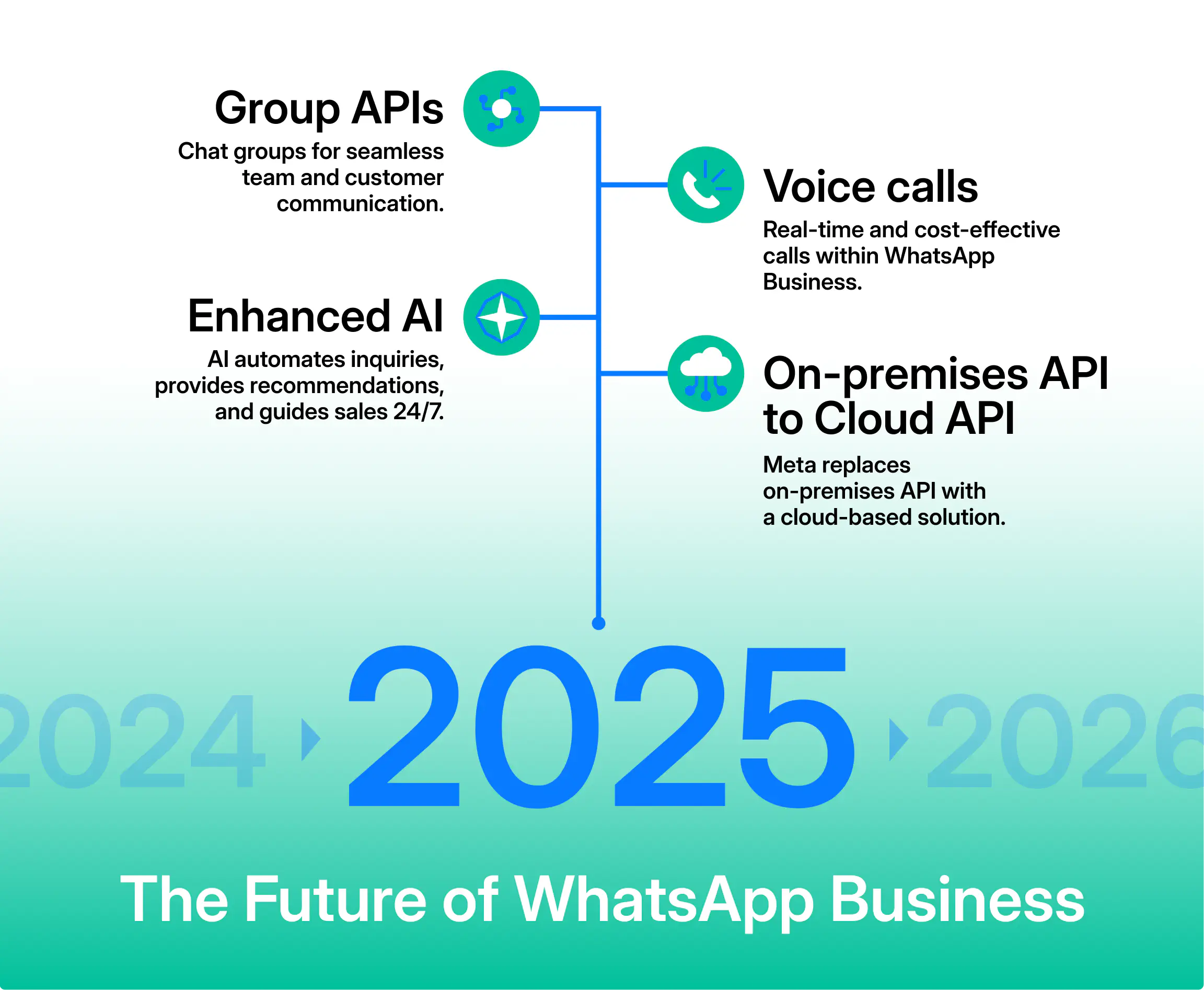
Meta’s vision for WhatsApp seems to be shifting toward the sales use case. Some of the new features users can expect soon that support sales are voice APIs, group APIs, and more.
Business Group Chats
Group API from Meta will allow you to create group chats on WhatsApp Business and add multiple people to a single thread. This means that you can create a group for all stakeholders and communicate with them at once rather than separately. You can also create groups with sales and customer service team members to make the customer handover process easier.
Voice calls
While voice calls are already a feature on the personal WhatsApp messaging app, they’re only starting to be available for WhatsApp Business users. It’s the perfect tool for B2B communication because it combines speed and personalization, the two aspects that get you more sales.
Here are the different ways voice calls can help your business once out:
- Centralization of all types of communication on a single platform (calls, messages)
- Providing hands-on, real-time support for customers
- Saving on costs for external calling apps
- Integrating voice interactions into sales and service workflows
Enhanced AI
AI is the future. That much is true for almost all industries that use WhatsApp, and of course, Meta wouldn’t miss a chance to incorporate it into the platform.
They’re releasing a new AI-powered messaging feature that’ll guarantee you don’t have any more missed opportunities because of customers contacting you outside office hours. It takes over conversations, answering inquiries, providing recommendations, and guiding prospects through the sales funnel, all with minimal effort on your team’s part.
This feature’s main aim is to increase sales and help scale customer support efforts.
Here are the most benefits of AI on WhatsApp:
- Sell after business hours: Your best leads don’t always come knocking during the 9-to-5 grind. With WhatsApp AI, your sales funnel stays active even when your team isn’t.
- Scale customer support efforts: AI works 24/7 and handles large volumes of inquiries, delivering consistent, accurate responses to every customer.
- Control and monitor workflows: WhatsApp lets you set times for AI responses, which gives you smoother transitions between automatic responses and live agents. This helps free up your team at times of high demand so that they can focus on priority tasks.
But these are upcoming features that haven’t seen the light in all countries yet. What about changes that have already happened?
Business API to Cloud API
Originally, WhatsApp Business API was offered as an on-premises solution. This means businesses had to host the API on their own servers, requiring them to manage hardware, software, and maintenance themselves.
In 2022, Meta introduced the Cloud API and announced the sunset of on-premises API, which meant businesses could access the API directly from Meta’s cloud servers, eliminating the need for expensive infrastructure or technical management.
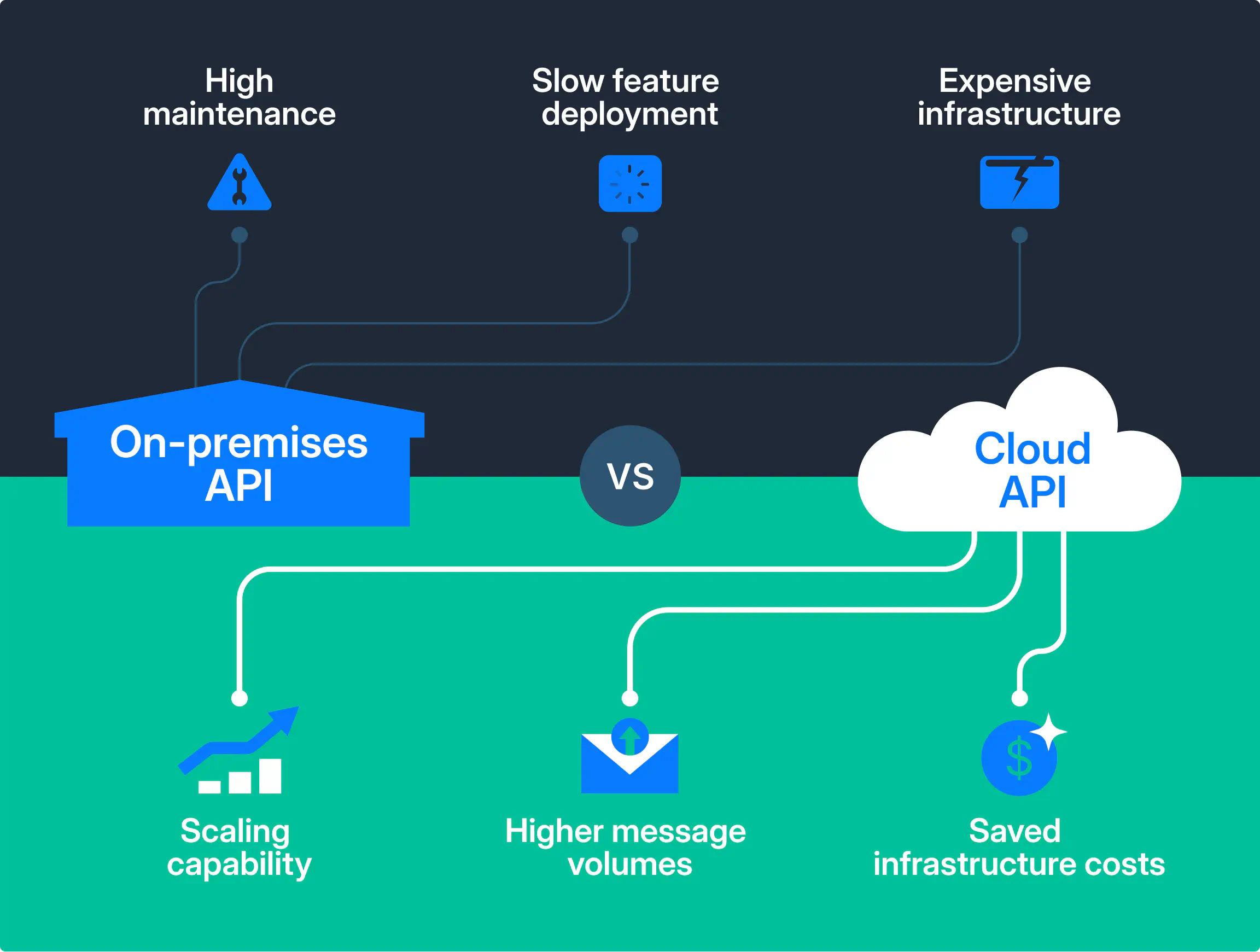
The Cloud API is faster to deploy, more cost-effective, and much easier to scale as businesses grow. What does it mean for sales, though? While the shift to the Cloud API doesn’t directly impact your day-to-day tasks, it will improve how you do your job in ways you might not have considered.
Moving to the cloud, WhatsApp becomes more scalable, efficient, and better equipped to integrate with your existing tech stack, which helps you communicate faster and build a more unified sales workflow.
Meta’s decision to push this update helps businesses, especially in sales, work smarter. The cloud enables faster development of innovative features like WhatsApp Flows, AI-powered chatbots, and automated messaging sequences at a lower cost.
But is that the only recent update that could support sales in B2B companies? No, there’s also WhatsApp Flows.
WhatsApp Flows
Sometimes, leads have to jump through hoops to get answers or place an order, which isn’t ideal. It’s always better to guide them through a smooth conversation, which is exactly what WhatsApp Flows does. It’s a feature recently introduced to help businesses build stronger relationships with customers.
With flows on WhatsApp, businesses can create interactive customer journeys that feel intuitive and personalized. They allow you to:
- Nurture leads by collecting information and offering personalized recommendations
- Onboard customers smoothly with in-chat forms and automated replies
- Reduce response time and increase customer satisfaction, especially during high-demand periods
For B2B sales, where relationships are key, flows on WhatsApp create an engaging, professional experience that builds trust.
Role of WhatsApp Business in B2B
WhatsApp is changing how B2B businesses will communicate with customers. B2B sales are known for being complex, with long cycles and multiple decision-makers involved. This often slows down the process and risks losing buyer interest. WhatsApp makes this process easier by providing features to support sales teams.
Here are some key elements that WhatsApp is well-positioned to help companies with:
Conversational buying
Today’s B2B business owners and decision-makers are the same people who, in their personal lives, make quick purchases on Instagram or Facebook with just a few taps. They’re used to fast and conversational interactions, and they expect the same ease in their professional lives.
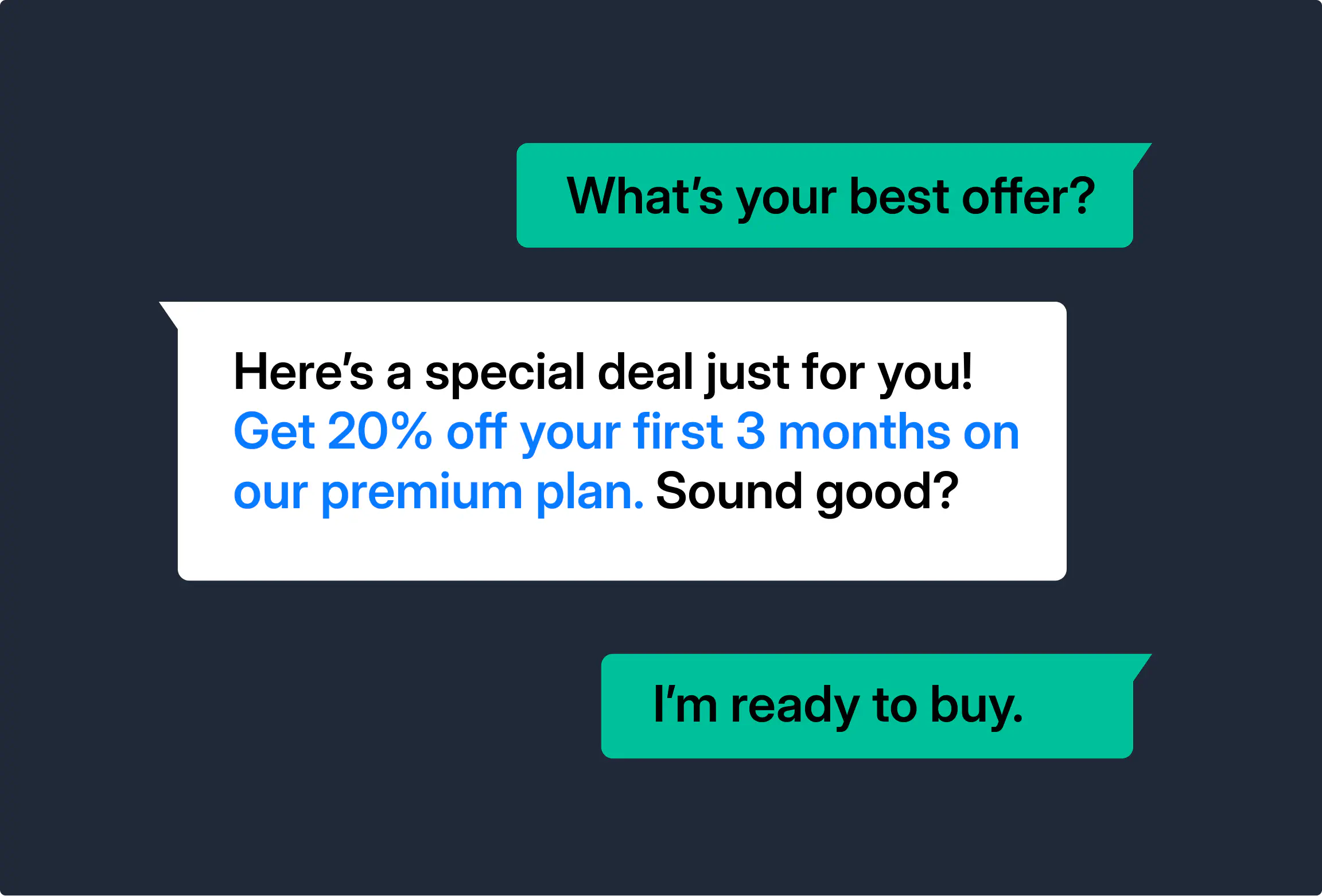
WhatsApp Business is a huge supporter of this new customer buying behavior, and it provides features to make it possible, like interactive buttons, quick replies, and chatbots. Buyers can now inquire about products, get instant responses, and even complete purchases, all within the same chat window.
Business scaling
Communication is a challenge for growing businesses. Suppose you’re a large company with multiple teams operating across multiple countries. Trying to stay connected with each other and with customers seems like a logistical nightmare, right? That’s where WhatsApp Business comes to the rescue.
WhatsApp provides the infrastructure to handle large volumes of interactions without sacrificing personalization. Its advanced API integrations allow the automation of repetitive tasks with chatbots and flows. Time zones are also no longer a barrier, as automated workflows and templates keep communication consistent, no matter when or where a message is sent.
Plus, with the possibility of personalizing templates and quick replies by adding customers’ names and personal info, WhatsApp allows your business to scale and build a genuine connection with customers without overwhelming your teams.
Impact of WhatsApp Business on B2B processes
Communication translates to sales. If, as we’ve seen above, WhatsApp supports B2B communication, then it also impacts sales and customer engagement.
To understand this impact, you need to see how industries started using WhatsApp Business and how WhatsApp enables smooth experiences for both customers and sales teams.
WhatsApp across industries
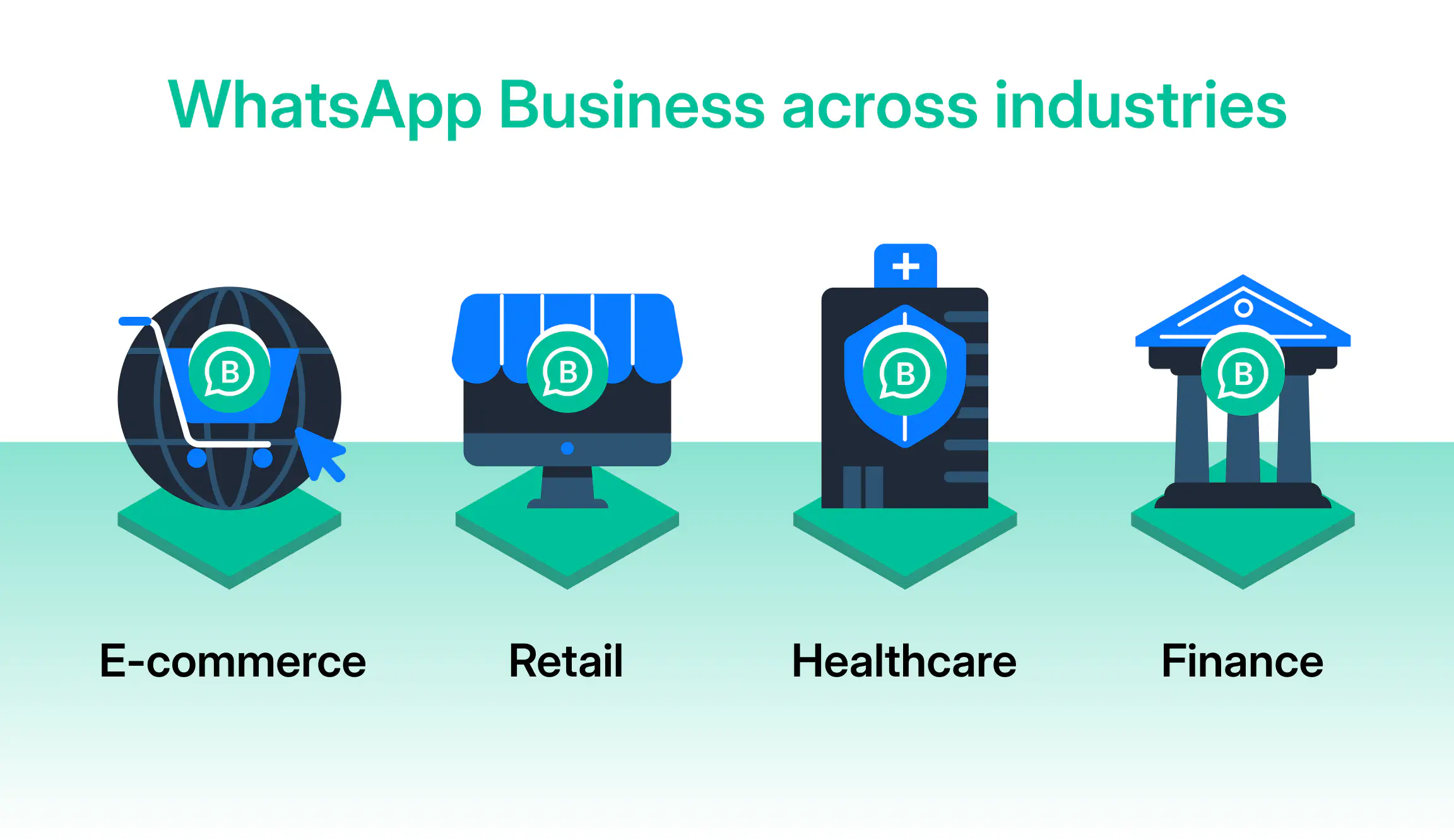
More industries are turning to WhatsApp Business because their customers already use it.
In eCommerce, brands now send product catalogs, personalized suggestions, and even collect payments, all in one chat. That naturally leads to more conversions.
Customer support has also evolved. What used to take days via email or phone is now resolved in minutes with real-time WhatsApp replies, improving both engagement and retention.
B2B companies, once reliant on formal channels, are now seeing WhatsApp as a powerful alternative. It supports lead qualification, nurturing, and team collaboration in one place, making it an increasingly natural fit for B2B sales.
WhatsApp for customer experiences
In B2B sales, success depends on one core element: customer relationships. And what shapes these relationships more than anything? Customer experience. It’s the key that determines whether a prospect becomes a loyal customer or just another lost opportunity.
This is where WhatsApp Business is supporting B2B customer engagement. Features like automatic responses, chatbots, and WhatsApp Flows are designed to improve the customer journey.
Even tools like message templates allow businesses to send personalized updates, quotes, or reminders outside WhatsApp’s 24-hour window, helping them build relationships without waiting for customers to initiate the conversation.
WhatsApp for sales agents experiences
WhatsApp Business has the customer experience handled, but what about the sales team experience?
When it comes to B2B sales, finalizing a deal is no small task. With long sales cycles, multiple decision-makers, and constant follow-ups, the process can often feel overhwleming. With this in mind,WhatsApp is a great tool for sales agents.
The beauty of the WhatsApp Business API shows here in non-native features that WhatsApp doesn’t offer but can be possible through third-party tools like Rasayel:
- Team inbox: A shared inbox centralizes all customer communication, which helps make sure nothing slips through the cracks when multiple team members are managing a single account or lead.
- CRM integration: These let you link WhatsApp to your existing CRM tools for a centralized view of every client interaction.
- Sequences: These automate follow-ups and keep leads engaged so that sales agents don’t have to keep track of every conversation manually.
How B2B Companies can use WhatsApp to grow
We’ve explored the tools, features, and potential of WhatsApp Business for B2B communication, sales, and support. But now it’s time to answer the most important question: why is WhatsApp predicted to become THE sales channel for B2B companies in the future?
Two facts answer this question:
- The rise of WhatsApp coincides with the fall of traditional channels
- WhatsApp can unify sales and support efforts, the biggest pain point for B2B companies
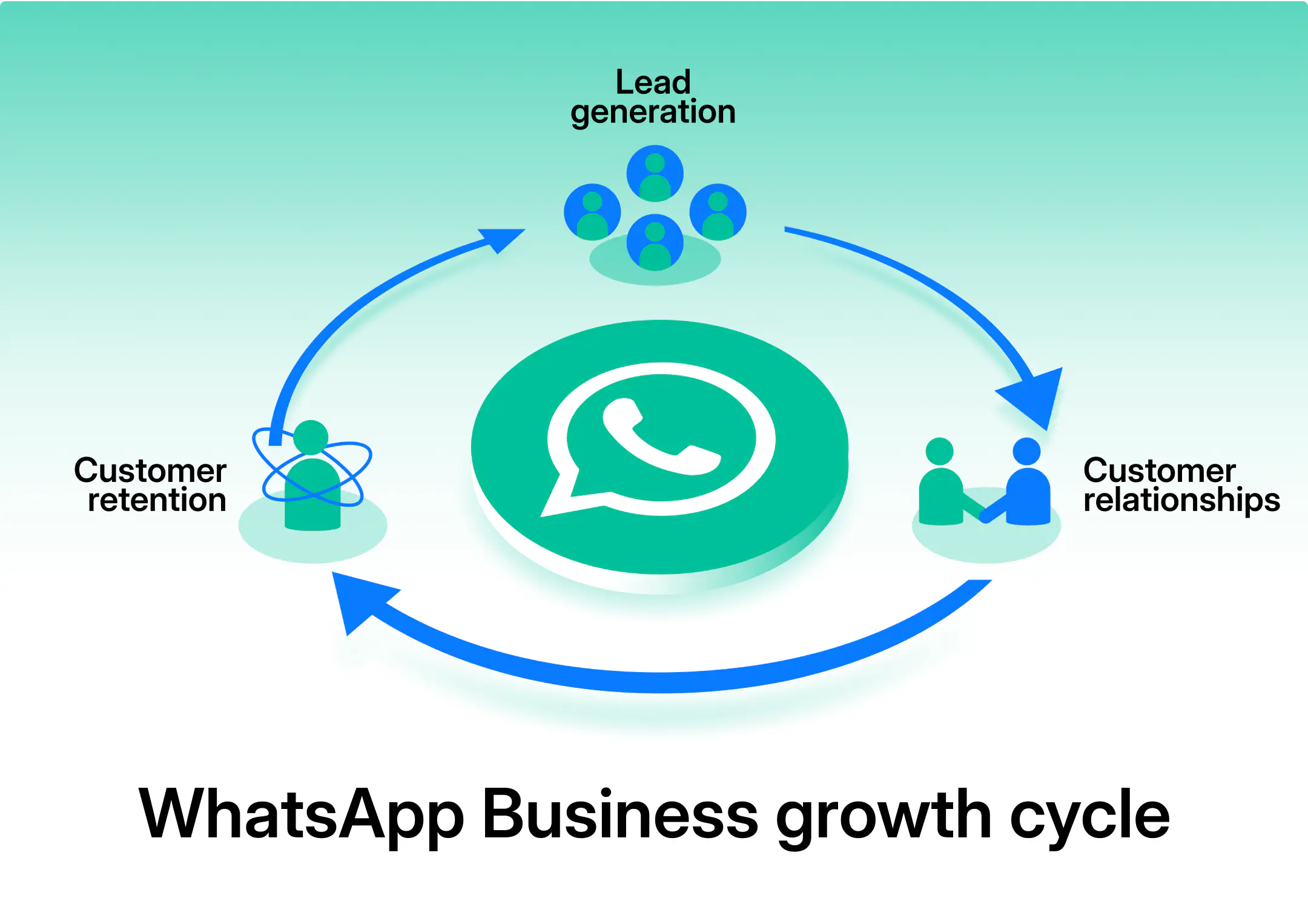
Why is WhatsApp the future of B2B sales
There are many
The decline of sales channels
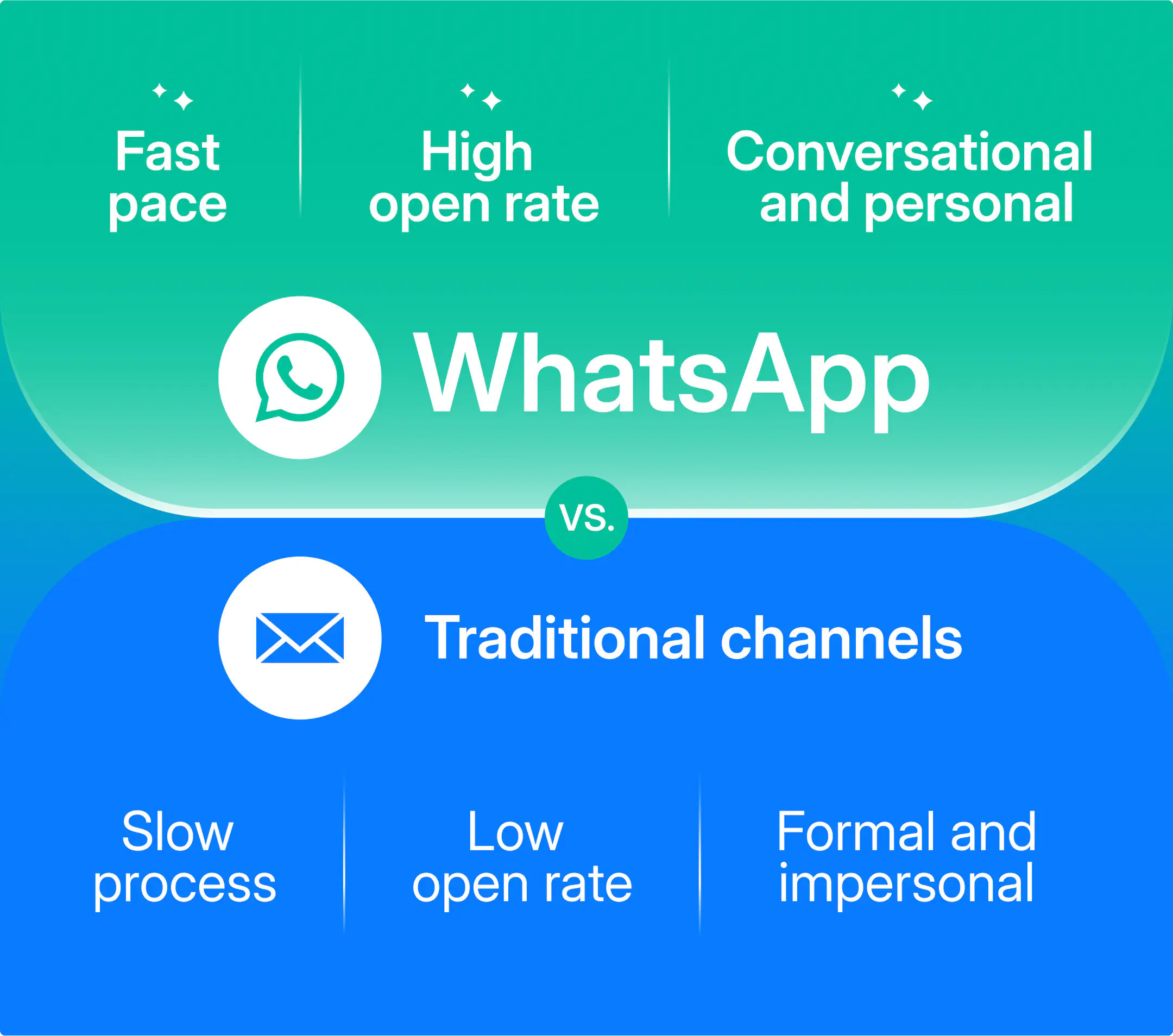
Email has long been the standard for business communication, but it’s quickly becoming clear that it can no longer keep up with the demands of modern sales teams. Slow response times, impersonal outreach, and cluttered inboxes make email less effective than ever.
In fact, by 2023, around 45.6% of all emails worldwide were flagged as spam. This means that nearly half of the emails people receive are ignored or discarded without ever being read.
Why is this happening? One big reason is that studies show that today’s workforce prefers instant messaging over long email exchanges. Their communication style prefers direct, short sentences over long paragraphs.
These shifts in communication styles are spilling over into email behavior, where even email users are seeking a faster way to interact. And what’s the solution? Messaging apps like WhatsApp are taking over.
This comes at the same time the use of WhatsApp is increasing in countries like India and Brazil, some of the world’s most populous nations and home to the largest growing middle class. Why? Because WhatsApp offers real-time, mobile-first, and cost-effective communication.
With lower internet costs and mobile phones being the primary means of access, WhatsApp provides an accessible and affordable alternative to traditional communication methods in these countries.
Seamless integration of sales and support tools
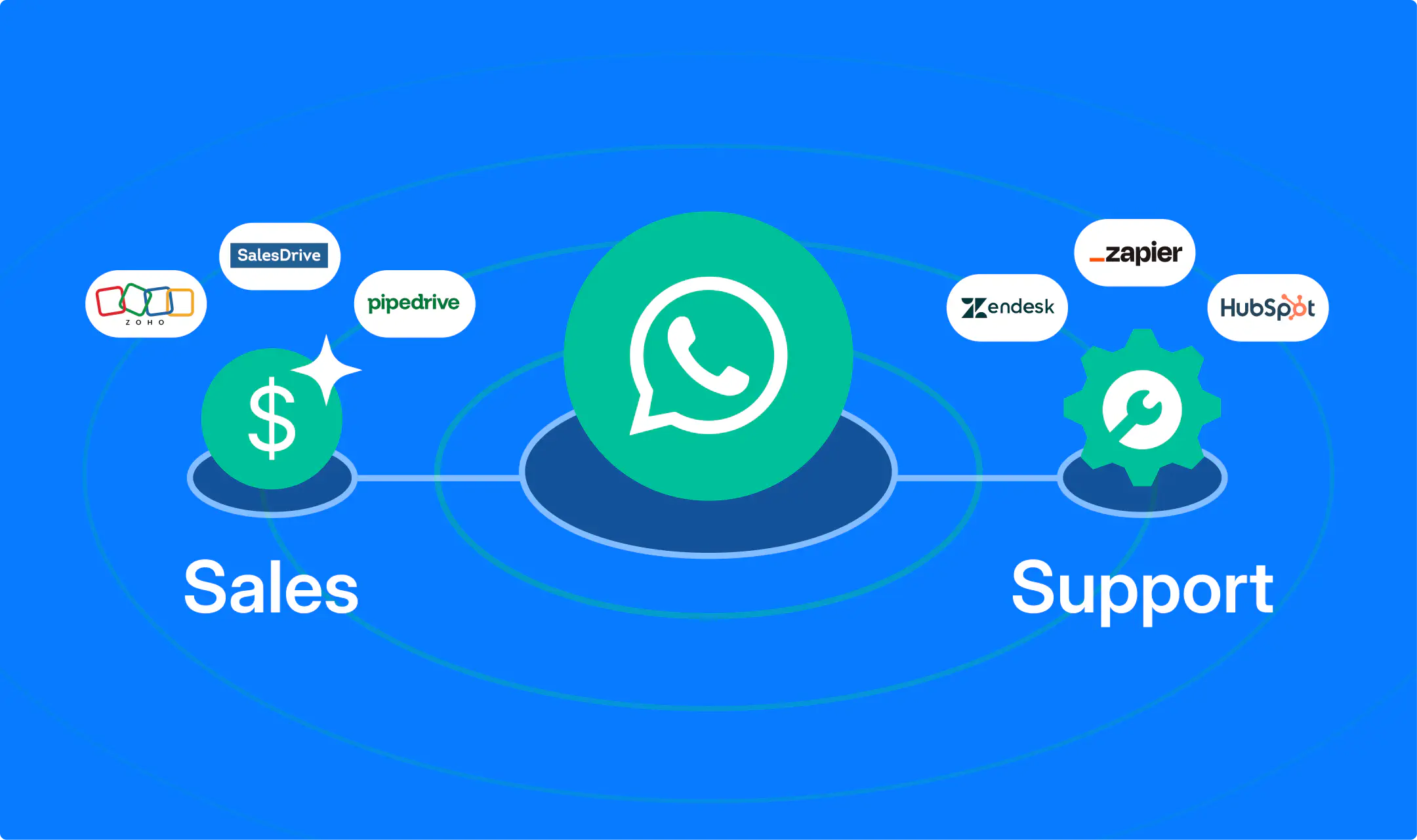
B2B sales teams are always looking for ways to improve workflows and boost sales. One of the biggest challenges they face? Unifying sales and support processes.
The reality is, many teams rely on a variety of tools that don’t always communicate with each other, creating silos of information and slower response times. This disconnect can lead to missed opportunities, frustrated clients, and a less-than-ideal customer experience. But with WhatsApp, this all changes.
It’s incredibly easy to integrate WhatsApp with your existing sales and support tools. With integrations available for popular CRMs, support automation software, and marketing automation platforms, you can sync your WhatsApp conversations with the rest of your customer data.
This gives you a complete view of the customer journey and ensures that your sales and support teams are always on the same page. Also, it helps your sales team close deals faster by providing them with the context they need. Finally, It boosts efficiency by allowing support teams to quickly assist with any post-sale issues without switching between multiple platforms.
In the end, the result is a consistent, end-to-end customer experience that strengthens relationships and boosts conversions.
Prepare for the future of B2B sales and engagement
After everything we’ve discussed, one truth remains: The future lies in WhatsApp Business.
From its real-time messaging to its integrations and automation tools, WhatsApp is already changing the way B2B companies connect with their customers. As we’ve seen, it offers faster responses, personalized interactions, and unified sales and support processes.
With new features on the horizon and the potential of building more thanks to the cloud API, using WhatsApp for B2B sales seems to be only the logical solution.
The time to act is now. If you want your B2B business to catch up with the continuous changes in the industry, invest in WhatsApp Business and the tools that integrate with it.

Ashraf is an expert in WhatsApp Business. He has helped 500+ B2B software companies run sales, support, and operations on WhatsApp. He specializes in WhatsApp Business API projects that reduce sales cycles and improve customer experience, and is great at both sales strategies and technical WhatsApp knowledge.

